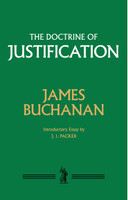
Buchanan, James
Description
John Owen presents one of the most rigorous defenses of the Reformed doctrine of justification ever written. This reprint of The Doctrine of Justification by Faith, taken from the nineteenth-century edition produced by the Presbyterian Board of Publications, will serve as a welcome improvement for many readers. Latin and Greek quotations have been moved to footnotes, and English translations are given for those large blocks of material that Owen left untranslated. It also contains a new introductory essay by Carl R. Trueman, which analyzes Owen’s treatment of justification in light of the highly charged debates of his day. While Owen’s work is technical and challenging, this edition is an effort to make his profound exposition more accessible.
Contents
John Owen on Justification, by Carl R. Trueman
Preface
General Considerations
Endorsements
“John Owen’s treatment of justification is a classic example of Reformed orthodoxy at its best; rooted in the ongoing anti-Pelagian trajectory of Western theology and operating within the established Protestant consensus, Owen yet demonstrates the ways in which that consensus was itself under strain—exegetically, theologically, and socially—in the seventeenth century, and how it was necessary for doctrinal formulation of the doctrine to undergo careful elaboration in order to respond to such. In particular, his defense of the imputation of Christ’s active and passive righteousness and his vigorous rejection of Baxter’s accusations that his theology was antinomian and demanded a doctrine of eternal justification point toward the covenantal/Christological heart of his theology. As such, he is an example of how federal theology could be deployed to set the Protestant confessional consensus on a much firmer conceptual foundation than was the case in the early Reformation, and also how Reformed orthodoxy’s theological structure is highly elaborate and irreducible to sound bites about dogmatizing. Rather, Owen’s treatment exhibits the typical Reformed attention to the exegesis, doctrinal synthesis, and church consensus and is one more piece of evidence as to how and why the Reformed faith became more elaborate in its argumentation during the course of the seventeenth century.”
—Carl R. Trueman, from the introductory essay
About the Author
John Owen (1616–1683) was a leading Puritan minister and theologian who served as a chaplain to Oliver Cromwell and later as dean of Christ Church in the University of Oxford.